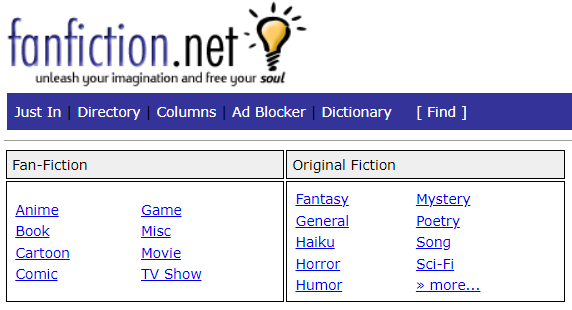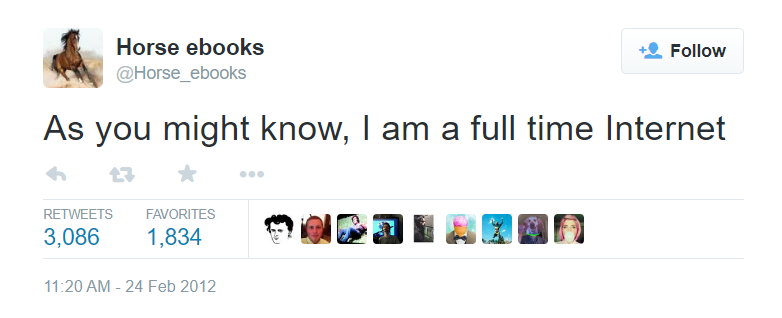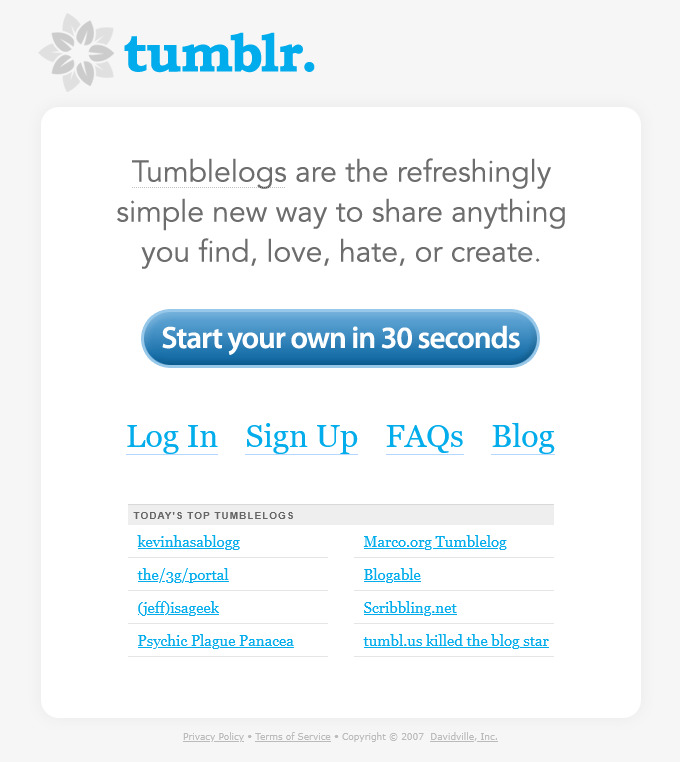The Once and Future Web
or, A Brief Personal History of Online Social Fandom
“Computers aren’t the thing,” says Joe Macmillan (Lee Pace) in the pilot episode of Halt and Catch Fire, an underrated AMC drama about the rapidly changing tech landscape of the 1980s. (1) “They’re the thing that gets us to the thing.”
The show isn’t so heavy-handed as to spell out exactly what “the thing” is, though several possible answers are suggested: creativity, community, curiosity, and so on. When I think about my own early online experiences, these are certainly the elements that define them, that made the internet in the ‘00s an appealing place for teenage me to be. This website is an attempt to recapture some of that appeal and reclaim my time and space online, an admittedly nostalgic and perhaps overly optimistic endeavor, but one that feels worthwhile to attempt nonetheless.
My very first experience with the web was as a mail delivery system: the summer before I started high school, my best friend M moved out of state, and to keep in touch we exchanged email addresses. This was novel at the time but soon became second nature: we both loved to write already, and so spending hours every week composing and reading each other’s messages was a natural extension of our shared hobby. The topic of the messages also came naturally: although we would provide cursory life updates as necessary (“I can’t email next week because I’ll be at band camp”), our discussions were mostly of a fannish nature: which Buffy characters would you date, here’s why you should watch Veronica Mars, top five things I noticed while rewatching The Fellowship of the Ring for the forty-seventh time.
To outside observers these topics might have seemed superficial, but for us they were anything but: the topic of every message was really, here is this thing that I care about, that I think about often, that shapes how I view and interact with the world. I want to share it with you because I care about you, too.
It’s no surprise that M was the one who introduced me to fanfiction: we set up a joint account on fanfiction.net and immediately broke the rules by creating an interactive fic where commenters (“reviewers” in ff.net lingo) could submit questions for their favorite characters in a talk show format where M and I, under our digital aliases, acted as the hosts. It was silly and fun and drew a small group of regular reviewers who in turn became part of the fic lore, with their own nicknames and inside jokes.

When the fic was eventually taken down for violating site rules, M couldn’t understand why I wasn’t more upset about it and I couldn’t really explain it at the time. In hindsight the answer is obvious: the final product of the fic was never the thing, it was only the thing to get us to the thing, which was the little community we’d managed to accidentally create and, more importantly, the bond of friendship between the two of us.
We drifted apart in college and, not unrelatedly, so did my connection to fandom. By the time I got back online it was the beginning of the end of the internet I grew up with, the internet of fanfiction.net and fandom-specific sites like lordoftherings.net. Instead there was Tumblr—where I happily blogged and reblogged but had trouble making the kind of online friendships I had in the past—and an even newer and shinier website: Twitter.
For me, the novelty of Twitter was in its brevity, the character restriction seeming to encourage short, funny expressions that bordered on the absurd. I could type nearly any combination of words and be rewarded by a dopamine rush of likes: “DINOSAURS IN SPACE” or “can you get drunk off wine?” or all of the lyrics to "Safety Dance," 140 characters at a time.
It was at this point that I developed a working theory of the internet–based on gross misconceptions about almost everything (2)–that I was happy to share with my friends, enemies, and anyone who would listen. If the internet was an expression of the self, my theory went, then Twitter was the id: a place for impulsivity and raw, unfiltered thought, a hungry creature that fed on chaos and novelty. Tumblr was the ego, the truest expression of the self, the self at its most fannish and most joyful. Facebook was the superego, the self as mediated by society and/or what you’re willing to post when you know your high school English teacher is watching.

Obviously this theory said a lot more about my self-awareness (or lack thereof) than it did about the web writ large. It spoke to the fracturing of identity, the suppression of that which was too weird or obscure or uncool to reveal to one audience or another, the invisible crowd of followers for whom I was always performing, whether I was conscious of it or not. “On the internet, nobody knows you’re a dog,” the classic comic goes, which never quite made sense to me: on the internet, everybody is a dog, and we’re all competing to see who can do the best trick. Who can be the funniest or the meanest or the loudest, who can say the most outlandish thing and get away with it.
So I decided to give Tumblr another shot, and eventually made new online friends in the only way that has ever reliably worked: by talking about whatever I was interested in and not worrying about what anybody else thought about it. Some of these friendships made the transition from Tumblr to the exchanging of Instagram handles and began to take on a shape I was familiar with: “what do you think of the leaked One Direction album?” and “Text me as soon as you watch the new Shameless episode!” and "Top five reasons you should be watching Penny Dreadful." (3) And so on.
The computer was never the thing. The connection was the thing, the feeling of not being alone in your passion for a topic that many people would consider trivial, if they even think about it at all. Sometimes fandom feels to me like the signal fire scene in The Return of the King, a series of towers spread across great distances but able to communicate a single, simple message once the spark ignites: I’m here, I see you, we’re in this together.

As is the case with most of my hobbies, my participation in online fandom spaces has fluctuated over the years, but became an unexpected source of community again when I moved across the country and had a difficult time adjusting to the distance from most of my family and friends. Zoom and FaceTime could only fill the void so much, so I found myself with the time and inclination for old hobbies: television, fanfiction, and Tumblr. I watched, and wrote, and posted, with little thought for or expectation of an audience other than myself.
It probably shouldn’t have been shocking that writing and reading specific stories about specific characters would connect me to people I liked and admired and wanted to befriend and had things in common with but in this case, the timing was almost miraculous: just as I was beginning to form vague thoughts that at the time amounted to, “What if gender…?” here was a very queer and very fucking cool community where I could do exactly that.
The thought of losing this community was at the front of my mind when yet another cycle of Tumblr-is-dying rumors hit, mostly because somewhere along the line the site had become an extreme rarity: a public, community space for fans to gather and create and share our work. In my mind’s eye I could see the signal fires going out, the connections dying. Without the thing, you can’t get to the thing.
But in the midst of the frenzied sharing of Tumblr alternatives a post circulated about Neocities and caught my eye simply because it was something different, not the next greatest social media site but a place focused on the nostalgic and the weird and the obscure, where the satisfaction comes not from the number of followers or likes or shares but is more akin to that of having placed the posters on your bedroom wall in the perfect arrangement.
Because for all of Tumblr's benefits, I still find it all too easy to get stuck in the dopamine-seeking “Tell me I’m good” cycle of random positive feedback where the self is a constant performance. And although for me it certainly feels like a more authentic performance than many others, the urge remains to keep it short, keep it clever and funny and relevant to the interests of others, avoid at all costs the shame of the zero-notes post.
So, here we are. I genuinely have no goals for this website—or rather, none that are related to metrics or followers or feedback of any kind. My aim is to go down as many rabbit holes as possible, to write in an earnest way about the things I’m interested in, to share my enthusiasm the way I would in an email to my childhood best friend. To light a signal fire, perhaps, to say I’m here, I see you.
Maybe that’s the thing.
-K
Footnotes
- It's easy to imagine the initial pitch for HaCF being "What if Mad Men but '80s and also Don Draper was bisexual" but fortunately the show quickly becomes so much more than that.
- Also my working memoir title.
- Spoiler alert: reasons 1-5 were just Josh Hartnett and Eva Green having incredible chemistry every single week.
Further Reading
The I in the Internet by Jia Tolentino
sadgrl.online's Internet manifesto
Reclaiming Online Social Spaces by Ivan Papiol